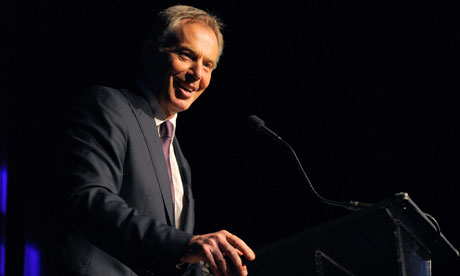“This man (Tony Blair) should be arrested
for war crimes. JP Morgan paid him off for the Iraq war 3 months after we invaded
Iraq, held up the Iraq bank for 20 Billion, he was then paid $6 Million every
year and still is from JP Morgan six months after he left office. THE MAN IS A
WAR CRIMINAL!” Exclaimed the man as he was throttled and finally gagged by a
swarm of security people.
Additional:

Tony Blair: 'a George Galloway with a
Learjet at his disposal'. Photograph: Todd Williamson/WireImage
If you wanted to see why Tony Blair is finished as
a force for good in politics, you should have been at the discreet, if
extortionately expensive, Haymarket hotel, off Trafalgar Square. Portland
Communications, publicists for what it calls "the government of
Russia" and everyone else calls "that thieving bastard Putin",
was holding a dinner for journalists and politicians it hoped to seduce on
behalf of one of its many other clients.
Blairites headed the guest list: Lord
Adonis, who has re-emerged as Ed Miliband's adviser on industrial policy; and
James Purnell, whom the Labour right see as the king over the water who will
one day return and restore Blair's heirs to their rightful inheritance.
In showing no disdain for the mouthpieces
of a dictatorship, Adonis and Purnell were doing no more than following the
example of Blair and his circle. Portland Communications is at its heart. Tim Allan, Blair's former
media adviser and Portland's founder, recruited his old friend, Alastair
Campbell, last week. A few months before, a Financial
Times reporter spotted Campbell at the airport at Astana, the
capital of Kazakhstan.
He wondered what had brought Campbell from his London home to a flyblown
central Asian dictatorship. Campbell would not say if his visit had anything to
do with Blair's latest business dealings. Few would be surprised if it had
because Blair's dealings are extensive.
As one astonished and disgusted former
supporter put it: "If you want to know what price a great man will sell
his legacy for, it's $13m." According to the Financial Times, that is the
sum that President Nursultan Nazarbayev has paid for Blair's services. His old
gang is along for the ride and eager to see what an oil-rich dictatorship,
which shoots strikers, burns the offices of opposition parties and kills their
leaders, can offer.
As well as the enigmatic Campbell circling
the carousels at Astana airports, a spokesman for Portland told me that it was
"reforming Kazakhstan's communications". Sir Richard Evans, formerly
of BAE Systems, who was once described as "one of the few businessmen who
can see Blair on request", now chairs the £50bn Kazakh state enterprise
Samruk and it in turn hires Peter Mandelson to deliver speeches.
The regime is grateful and not just for the
uses the Blairites' support can be put to abroad. Like every other
dictatorship, Kazakhstan wants to show its subjects that foreigners, who have
no reason to fear the secret police, endorse the regime of their own free will.
The backing of outsiders makes them seem more powerful and their propaganda
sound more plausible. (It is for this reason that George Galloway has been such
a popular figure in the presidential palaces of the Middle East.)
I know what you're thinking. Blair selling
out is hardly news. But – and Observer readers may not provide the most
sympathetic audience for this argument – there was always a case for Blair. His
dedicated adherents could see no wrong in whatever he did. But others,
including your correspondent, were, if you will, "left" or
"anti-totalitarian" Blairites. Whatever criticisms of his domestic
policies we had, we thought that when set against his enemies, Tony Blair was
an admirable man.
Historians trying to capture the hypocrisy
of Britain in the first decade of the 21st century may note, as we did, that
Blair's opponents turned on him not for allowing the banks to run riot but for
insisting that Britain should play its part in stopping the civil war in Sierra
Leone, in ensuring that Slobodan Milosevic could not ethnically cleanse Kosovo,
in helping throw the Taliban out of Kabul and in saying that after 24 years of
occasionally genocidal rule, Saddam Hussein must be removed from power.
Let one example from countless instances of
bad faith stand as an example of how sour polite society became. In 2007, John
Humphrys of the BBC interviewed Blair about the oppression in Iran.
Blair: "There is global struggle in
which we need a policy based on democracy, on freedom and on justice…"
Humphrys: "Our idea of
democracy?"
Blair: "I didn't know that there was
another idea of democracy…"
Humphrys: "If I may say so, that's
naive…"
Blair: "The one basic fact about
democracy, surely, is that you can get rid of your government if you don't like
them."
Humphrys: "The Iranians elected their
own government and we're now telling them…"
Blair: "Hold on, John, something like
60% of the candidates were excluded."
I do not pick on Humphrys because he was an
exceptionally wicked man, but because his approach was so depressingly
commonplace. Iranians and other lesser breeds could not expect the rights we
enjoyed, and it was "naive to think otherwise". Blair replied in
admirably plain language. His commitment to democracy and human rights was
absolute. Moreover, it was universal: if free elections are good enough for
Britain, they are good enough for Iran and no weasel words about theocrats
having their "own" version of democracy can be allowed to pass
uncontested.
By necessity, Blair was also an
internationalist, because, as he said in his Chicago
speech of 1999, which was by some measure his finest: "We are
all internationalists now, whether we like it or not… we cannot turn our backs
on conflicts and the violation of human rights within other countries if we
want still to be secure."
His back is turned now and the plain
speaking has gone. He won't explain why he's helping the Kazakh dictator
present a better face to the west. Apparently, he has said that he is not
personally profiting from appearing in a propaganda video praising the
dictatorship's "progress" and hymning its "extraordinary
economic potential". (I say apparently because his office would not
respond to my repeated inquiries.) But it is beyond doubt that his commitment
to democracy is now as flimsy as any relativist's: free elections may be good
enough for the people of Britain, but the Kazakhs cannot expect to enjoy the
same privileges.
Blair's mindless admiration of wealthy men
explains his decline. In the 21st century, they tend to be dictators with
sovereign wealth funds and tame oligarchs to command, or financiers. No
surprise, then, that as well as advising Kazakhstan, Blair also advises JP Morgan.
His love of money has brought down the
worst fate that could have befallen him. He now has the manners and morals of
his opponents. He has become a George Galloway with a Learjet at his disposal.

Re: Nick Cohen's 'Tony Blair's moral decline and fall is now complete'. I detect some double-talk and whilst we are grateful for the reaffirmation to some degree of Blair and Co's crimes, drawing similarities with Galloway shows up Cohen's deeper agenda of misinformation. For us it's more meat on the bone.
ReplyDeleteBetter ideas welcome.